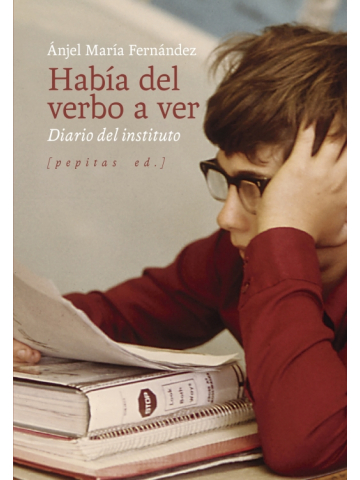- Books
- 2 de May de 2024
- No Comment
- 7 minutes read
From realism to tragedy: “Había del verbo a ver. Diario del instituto”, by Ánjel María Fernández

From realism to tragedy: “Había del verbo a ver. Diario del instituto”, by Ánjel María Fernández
The problem lies in the fact that incidents like those depicted in this book occur, and we choose to turn a blind eye


Pepitas de Calabaza publish this raw diary of a professor who has completely lost faith in the Spanish educational system. We journey with Ánjel María Fernández through a labyrinthine world governed by rules that no one follows and routines that gradually undermine the health of teachers and students, who end up hating each other in a cursed space.
For several months, I have been compiling, reading, and analysing political dystopias. From Nosotros (1920) by Evgeni Zamiatin to Enemies of the System (1978) by Brian Aldiss, and including works by Orwell, Pohl and a myriad of imperial fantasies, I have been meticulously documenting various ideological hells and landscapes devastated by social control and class hatred. I can confidently say that nothing I’ve read is as visceral as the contents of this succinct diary of a teacher who gradually says farewell to his profession amidst physical discomfort and nightmares. At times, I found myself empathizing with his anguish (I once worked in a so grotesque and hostile centre that my spine painfully contracted upon crossing the threshold, the creaking of my vertebrae audible to my ears). However, there were instances when I yearned for a humanistic perspective, a lifeline and a vessel for the future, a neo-ethical vision that is evident in, for instance, the prose of another recent classroom diary, Notebook of a Teacher, by Alberto Royo (Platform, 2019).
Music and irony were Royo’s salvation; writing was the refuge for Ánjel María Fernández, and for me as well. There was a period when I witnessed such madness (children with autism being beaten, students in crisis attempting suicide by hurling themselves down stairwells, neglected minors huddled in rooms doing nothing for hours, groups recording horrifying pornographic videos in high school restrooms), and such atrocities (I had to testify to the police on occasion about the unbelievable actions of fourteen or fifteen-year-olds) that the only way to maintain my sanity was to fill the backs of exams with dense handwriting.
Then came another chapter in my life: every day teachers call or write to me weeping. Thay had been falsely accused of the most improbable invented crimes, or they were simply being crushed by unbearable conditions, the ominous silence of the administration, or the disdain of some management teams. But I have never read anything as hard as this book, something so hopeless and sad. My analysis of dystopias is an attempt to comprehend the intricate web of power in our bewildering society. That’s why I believe the raw and candid prose of this diary’s author plunges into the depths of brutal honesty, as the context has become unbearably grotesque. We approach the work of Ballard or Octavia E. Butler because they mirror our internal and societal disorders, just as this grotesque diary is tragic and distorted, reflecting the state of our society.
There are too many teachers who have not made it through. A recent account from a teacher left me between perplexed and traumatized: on her first day in a centre, without having received a single orientation or welcome, she was ushered into a classroom housing five distressed Maghrebi teenagers, newly arrived, and another five minors diagnosed with Autism Spectrum Disorder. Without any program, assistance or any means of communication, the boys cried, clueless about their presence there, and anxiety attacks began. This teacher was a philologist… she asked for help from the Educational Guidance department only to be told that the school was “inclusive” and that they could spare her a mere two minutes. In essence, she had to make do as best she could. She returned home in tears and lasted less than a week before taking medical leave for depression. I often think about these teenagers, deprived of their most basic rights, I think about the small vertical dystopias that an absurd public order condemns to suffering. I reflect on the apathy, the downfall of a democracy that deceives itself with words as solemn as they are deceptive.
This is why the author employs such raw realism, a style already adopted by the most nihilistic of tragedies. The problem is that all this happened; in other words, it’s real. Just like the narratives of the victims, students and teachers, that reach me daily. Every day thousands and thousands of happy moments occur in the Spanish educational system. I will not deny this. I will not refute the frequent sunny days spent teaching. I have experienced immense joy in teaching. The problem lies in the fact that incidents like those depicted in this book occur, and we choose to turn a blind eye. There’s an excess of violence, too many dysfunctional situations. Too much silence. Too many questions. Too much despair and too much immorality. The problem is that the brightest light coexists with the bleakest darkness: if only a more serene normality would invite everyone to learn and teach with the necessary calm. We know that this is not often the case, and we deny the evident: there are far too many victims and already too many unattended cries for help.
- Book Editorial : Pepitas de calabaza; N.º 1 edition (October 25, 2023)
- Language : Spanish
- Softcover : 168 pages
- ISBN-10 : 8418998490
- ISBN-13 : 978-8418998492
Source: educational EVIDENCE
Rights: Creative Commons

